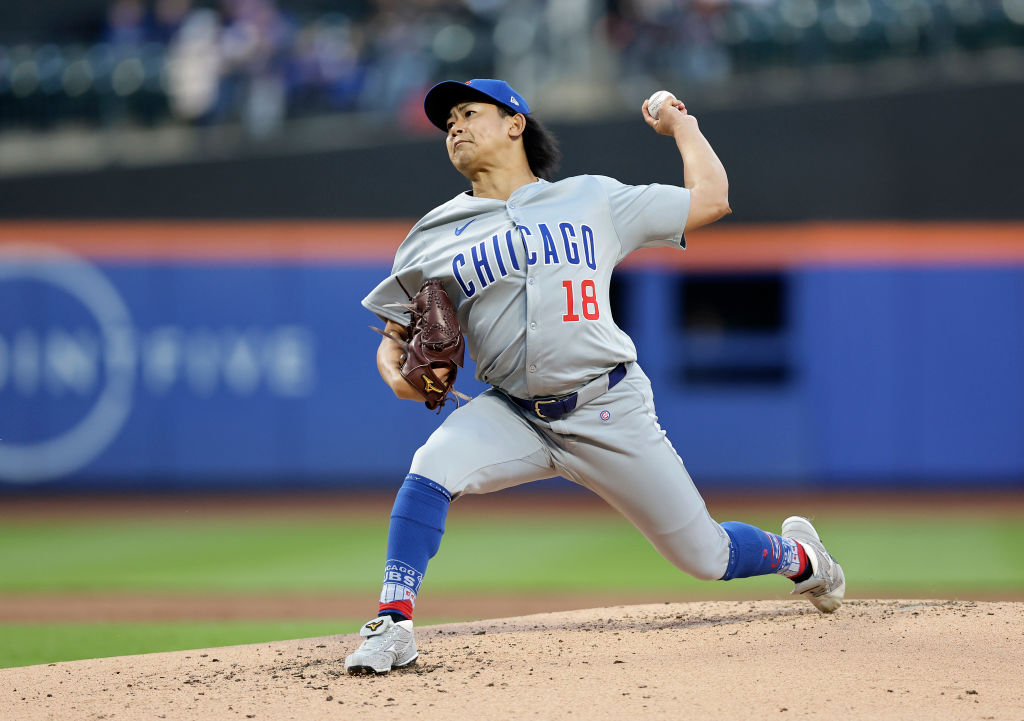



Shota Imanaga of the Chicago Cubs in action against the New York Mets at Citi Field on May 01, 2024 in New York City. The Cubs defeated the Mets 1-0. (Photo by Jim McIsaac/Getty Images)
It takes years – perhaps as much as a decade, sometimes more – to fairly evaluate a draft class and determine which team “won” the draft, regardless of what sport is being discussed.
But looking at last offseason, it doesn’t take long to determine which team got the most value from an international free agent signing.
The Chicago Cubs signed Shota Imanaga to a four-year, $53 million deal in early January. And while the contract the Cubs gave Imanaga was overshadowed by the massive nine-figure deals the Los Angeles Dodgers gave Shohei Ohtani (10 years, $700 million) and Yoshinobu Yamamoto (12 years, $325 million), so far, the Cubs look like they’ve made a steal on the open market, even when you add in the $9.825 million posting fee the Northsiders paid to Nippon Professional Baseball’s Yokohama DeNA BayStars to take Imanaga away.
According to Sportrac, Imanaga will cash checks from the Cubs worth $9.25 million this season, while Ohtani will put $70 million in the bank from the Dodgers. Yamamoto will sock away 9,166,666 dollars this year, but that number will rapidly escalate in the coming seasons, with the young pitcher earning at least $32 million per year in the final six years of his deal with the Dodgers.
In 2027, Imanaga will make $15,250,000 and stands to earn $17 million if the Cubs exercise their club option.
So far, Imanaga has been stellar for the Cubs. In six starts, he’s thrown 34.2 innings and struck out 35 batters while posting a WHIP of 0.75 and an ERA of 0.78. He’s earned the win in five of those starts, and while the pitching win is a stat that, rightfully, is valued far less than it was in the past, it is reflective of the fact that Imanaga is giving the Cubs a chance to win every time he steps on the mound.
The one game that Imanaga has pitched where he didn’t win this year – an 8-1 Cubs win against the Dodgers on April 7 at Wrigley Field – he was still spectacular, going four innings and allowing no runs on two hits with three strikeouts and no walks on a 47-degree overcast day with a two hour, 31-minute rain delay in the bottom of the fourth that ended Imanaga’s day, denying him a win because a starting pitcher has to go five full innings to be eligible for the win.
The key to Imanaga’s success has primarily been mixing four-seam fastballs up in the strike zone with a splitter that catches the bottom edge part of the zone and draws whiffs 43.4 percent of the time, according to Baseball Savant and a sweeper that cuts towards right-handed hitters. While Imanaga’s fastball, which averages 92 mph, is not overpowering when contrasted with the 81-82 mph average of the splitter and sweeper, the mix of movement and change in velocity is lethal.
This week, Imanaga made his first appearance in New York, facing the Mets at Citi Field on Wednesday. He allowed three hits over seven innings, struck out seven, and walked one in a 1-0 Cubs victory.
“All intelligent investing is value investing—acquiring more than you are paying for. It would be best if you valued the business to value the stock,” Charlie Munger, the vice chairman of Warren Buffett’s Berkshire Hathaway corporation, has said.
What more could the Cubs ask from Imanaga?
He’s the best pitcher in Major League Baseball, and the Cubs got him for a song.